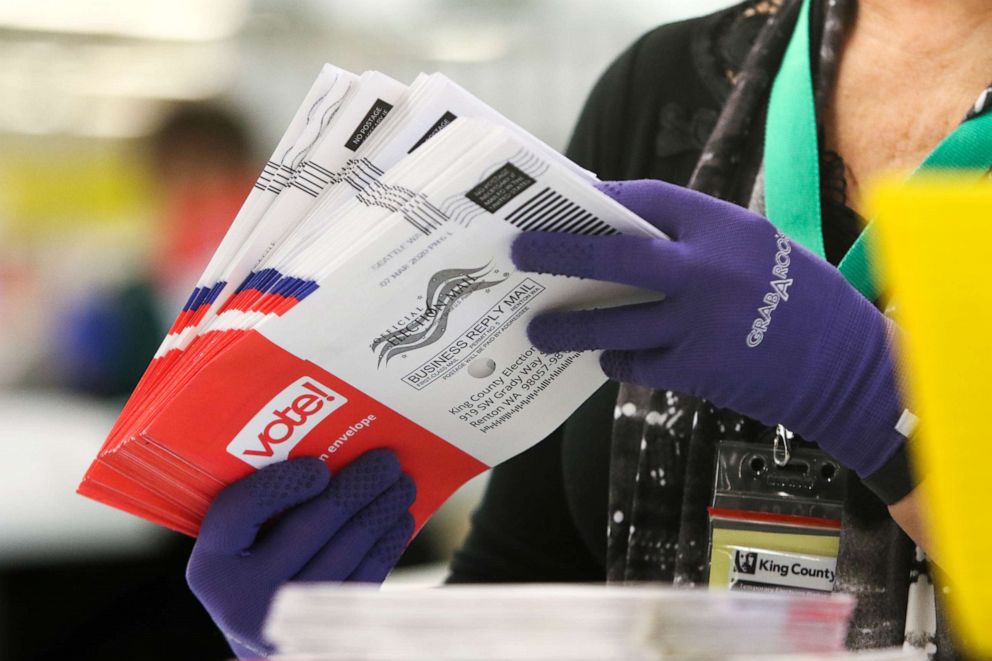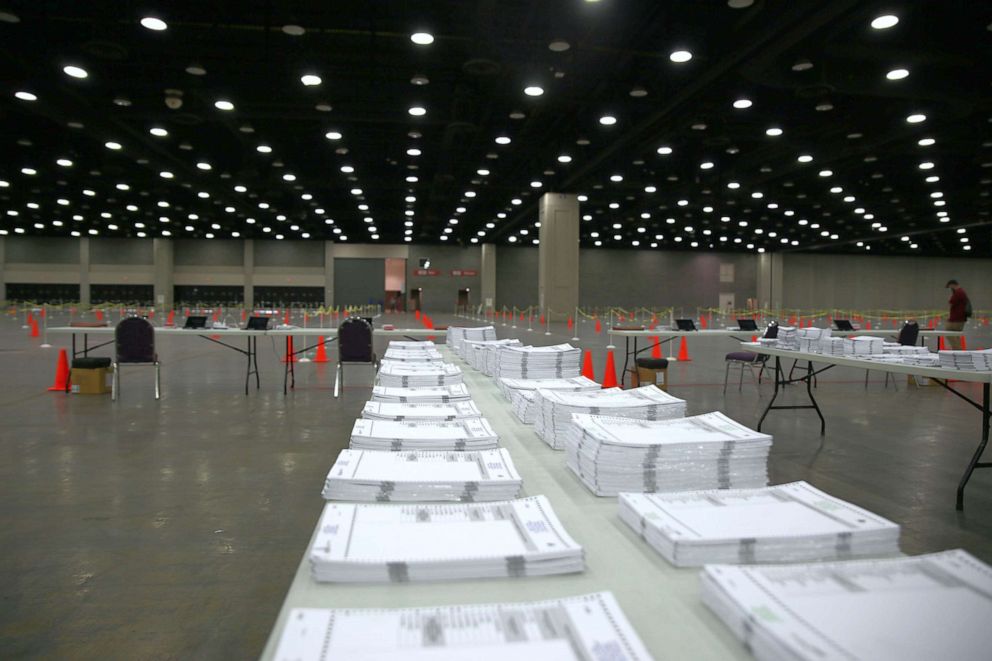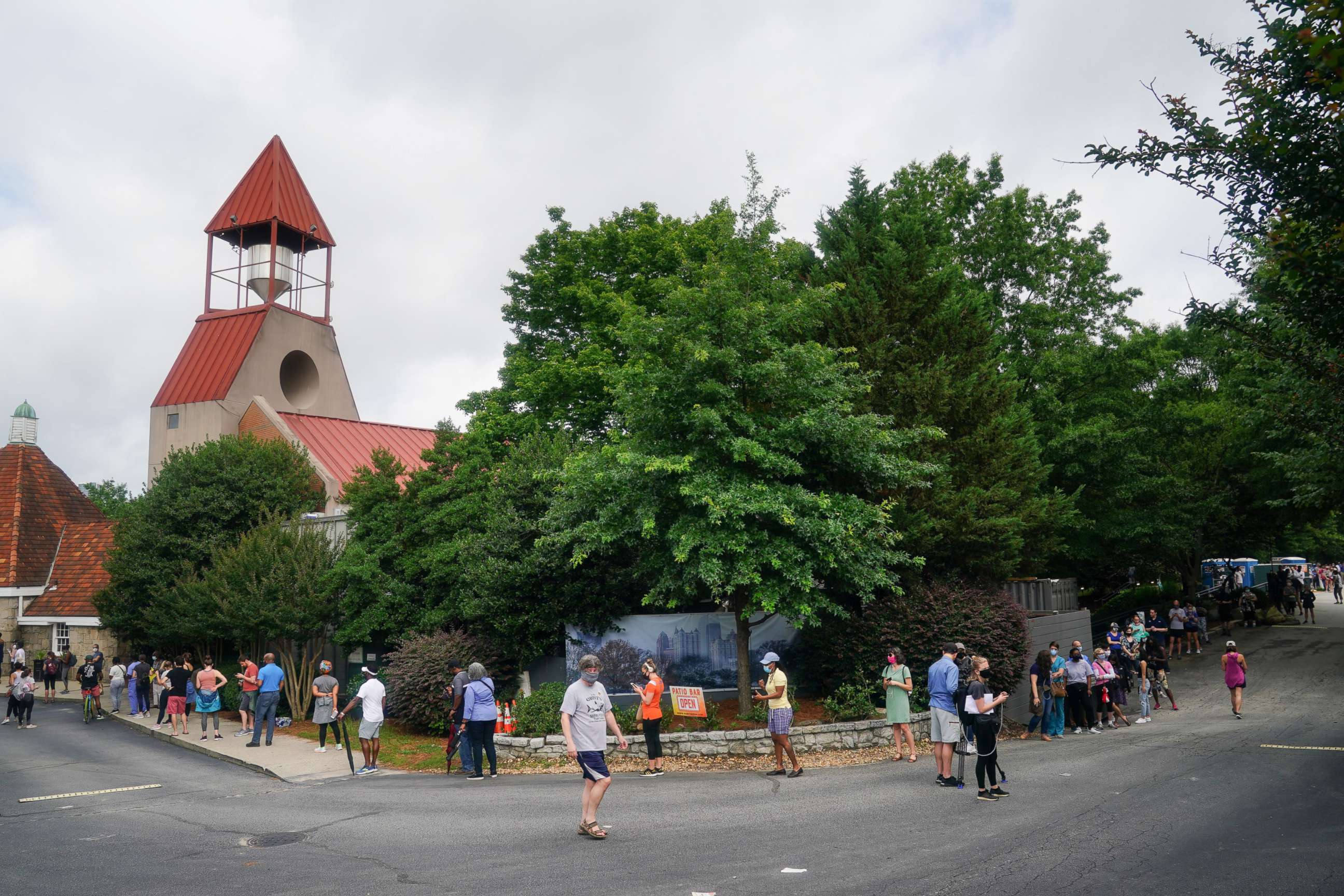Alexandria Ocasio-Cortez wins primary as voters in 6 states cast ballots
Two weeks after Georgia's messy primary, another six states voted.
Just two weeks after Georgia's messy day at the polls, another six states tested the waters of voting during the coronavirus crisis on Tuesday in the final stretch of the primary season.
Among the six, two drew outsized attention -- Kentucky and New York -- where a competitive Senate Democratic primary to take on Senate Majority Leader Mitch McConnell and a handful of congressional races are expected to be settled, but likely not on election night -- further fueling trepidations for the fall.
In New York, Rep. Alexandria Ocasio-Cortez, D-NY, successfully defended her seat for the first time, dispatching a number of challengers, including former CNBC journalist Michelle Caruso-Cabrera. The congresswoman had more than 70 percent of the vote when the Associated Press called the race in her favor.
"When I won in 2018, many dismissed our victory as a 'fluke,'" she said on Twitter. "Tonight we are proving that the people’s movement in NY isn’t an accident. It‘s a mandate."
Virginia, Mississippi, South Carolina and North Carolina are also holding statewide races and primary runoffs.
Since the onset of the pandemic, states have seen election days with hours-long lines, poll worker shortages, a surge of mail-in ballots or all of the above, plunging the process into chaos. This familiar fate is emerging as a new normal -- and one that the next slate of states are aiming to avoid as they brace for Tuesday.
In New York, as the state's on-again/off-again presidential primary was ultimately put back on again, election officials, readying for the rest of the elections on the ballot, franticly moved to prepare their staff and voters for the large-scale changes COVID-19 imposed on the electoral system -- and at a scale far greater than for previous contests.

"You had elections that got rescheduled, and then rescheduled again, and got canceled, and then rescheduled. You've had some elections that have been canceled," John Conklin, the spokesman for the New York State Board of Elections, said. "So as things get rescheduled and more elections get piled onto the same day, it does create a lot more stress for the local boards to have to deal with all those things."
The quick adjustments included undertaking one of the largest expansions of vote-by-mail in one of the more restrictive states for the option, possibly setting up challenges on Tuesday. More than 1.8 million absentee ballots have been requested so far, according to the most recent data from the state board of elections, which compares to only 115,178 absentee ballots in the 2016 presidential primary -- underscoring the state's preference for in-person voting.
A massive influx of absentee ballots, along with potentially long lines at polling sites, could usher in more concerns for November's election, particularly since the state is not planning on counting absentee ballots until all those ballots are in.
"So the most important thing for the public to know the process here in New York is going to be lengthy. The deadline for the boards to receive absentee ballots is June the 30th, that's a week after the primary. So, they're not going to be opening and starting to count absentee ballots until July 2 at the earliest," said Susan Lerner, the executive director of Common Cause New York.
"Two weeks includes the July 4 weekend," she said. "So there's a very real possibility that we may not have truly reliable results, until after the July 4 weekend -- and how far after July 4 we don't know."
Only in-person and early vote totals are expected to be released around the time polls close, which will likely represent a minority of votes for the election, according to Conklin.
The anticipated wait for complete results could muddle a number of highly anticipated congressional races on the ballot, including in New York's 16th Congressional District, where Congressman Eliot Engel, D-N.Y., the 30-year incumbent, is up against one of the toughest intraparty showdowns against Jamaal Bowman, an educator who has consolidated the progressive wing behind his bid, including endorsements from Rep. Alexandria Ocasio-Cortez, Sen. Bernie Sanders and Sen. Elizabeth Warren.
A similar scene is expected in Kentucky.
In the Bluegrass state, the Democratic governor and Republican secretary of state took a bipartisan approach to recalibrate plans for the election, which was postponed from May due to the coronavirus. But preparations to mitigate the risk of COVID-19 also led to scaled down in-person voting, with only 170 polling sites open for Tuesday, a fraction of the nearly 3,700 in a normal election.
A minimum of one in-person voting location was required in each county, according to guidelines set by the state board of elections -- but it was up to the counties, who were facing poll worker shortages due to the coronavirus, to cut the number of polling locations in plans submitted to the state board of elections, according to a state elections official.

In Jefferson and Fayette counties, the state's two largest which cover Louisville and Lexington, officials settled on only one polling site in each. It's a hurdle that is potentially more acute for Jefferson, where there are more than 616,000 registered voters and about one in five residents are African American, according to U.S. Census data - one of the largest Black populations in Kentucky.
The decision by local officials to limit in-person voting to one polling place caught the attention of basketball star, LeBron James, who called it "systemic racism" and "oppression." James weighed in shortly after eleventh-hour legal attempts to add additional polling sites across the state failed late last week, citing the risk of voter confusion due to last-minute changes imposed by the courts.
But not all registered voters are expected to head to the polls. In Jefferson County, of the total number of registered voters, 35% have already been mailed an absentee ballot, according to the most recent data from county election officials.
And both counties are housing their sole polling locations inside significantly larger-than-normal sites, with Jefferson using the Kentucky Exposition Center, which is the size of four indoor football fields, and Fayette County using the University of Kentucky’s massive Kroger Field. The expo center will "provide a layout of the almost 2,200 different ballot styles at the same time," Nore Ghibaudy, a county clerk spokesperson, said.
State Rep. Charles Booker, who is competing in the Senate Democratic primary invoked the state's history of disenfranchisement, before saying that state and election officials are doing "the best they can" under the circumstances.
"So many folks in Kentucky have been disenfranchised. And I know we're dealing with COVID-19. I know the governor, secretary of state, the state board are trying to do the best they can but having one polling location in Jefferson County, with hundreds of thousands of people, it's just gonna naturally disenfranchise folks," Booker told ABC News' Senior Congressional Correspondent Mary Bruce in an interview Monday.
"There have been steps taken for in-person voting and I've had shuttles going throughout the community, getting people to the polling location throughout the week and we're hopeful that the process will be smoother (Tuesday), that there won't be incredibly long lines," he added.
Similar to New York, results from some Kentucky counties, including Jefferson and Fayette, are expected to be delayed for at least a week, if not more, as a crush of absentee ballots overwhelm local election officials. Those counties won't even be releasing partial results until June 30, the extended deadline for all counties to report returns, Secretary of State Michael Adams announced in a statement late last week.
"A clerk is always nervous about election day and this one is no different," Don Blevins Jr., the county clerk in Fayette County, told ABC News in an email. "There will be lines, the question is will they be manageable or not."

"There are indirect indications that the numbers will be manageable but it is very difficult to predict," he continued. "We have a record level of turnout already, far exceeding any presidential primary dating back to 2000. This, coupled with reasonable usage of our in-person by appointment site may indicate that most have already voted."
With the majority of votes on election day not being reported, candidates in some of the state's more high-profile races -- such as the Senate Democratic primary contest between Amy McGrath, a former Marine fighter pilot, and Booker, the youngest black state lawmaker in Kentucky -- are planning for a long, tense wait.
The real-time scrambles by election officials to adjust as the pandemic persists are laying the foundations for November's election. But any chaos could mark new cautionary tales at the national level.
"There may be some lines, that’s not avoidable. That’s every election that we’ve ever had," Jared Dearing, the executive director of the Kentucky state board of elections said during a board meeting on Monday. "But the hope here is that we've relieved as much of the stress and pressure off of the election day system."
ABC News' Meg Cunningham and Benjamin Siegel contributed to this report.




